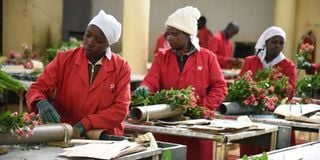
Workers at Equator Flowers in Eldoret, Uasin Gishu County sort flowers for export on March 16, 2020.
What you need to know:
Flower farms were banking on this year to grow cut-flower sales as well as expand to additional markets in Asia, Europe, Australia and North America before the Covid-19 pandemic struck in March.
The emergence of the virus, however, changed this after countries imposed tough lockdown measures such as border closures as well as bans on both local and international flights to contain its spread.
These measures resulted in cancellations of overseas orders resulting in an estimated 40 percent plunge in sales. Consequently, workers were subjected to pay cuts or sent on unpaid leaves.
The approval of both Pfizer BioNTech and Moderna Covid-19 vaccines by health regulatories in the U.S., Canada and United Kingdom (UK) offers a glimmer of hope to the sector going into 2021.
The above-mentioned countries are among Kenya’s top-source markets for cut-flower hence it cannot afford to lose them.
Kenya Flower Council (KFC) chief executive officer Clement Tulezi says they are looking forward to next year as a recovery launch-pad.
“We thought that we would take too long to recover but I think it has worked very well. For flowers, for example, we thought by June 2021 is when we will be close to recovery, safe for the lockdown that we are seeing in the Netherlands,” Mr Tulezi said.
Fresh lockdowns were imposed in European countries such as France, UK and Germany in November and December, amid the rising cases of the virus.
This came after similar lockdowns were lifted following their introductions in the earlier months of 2020.
In 2019, for instance, Kenya exported 173,719 metric tonnes of flowers globally with approximately 121,603 tonnes going to Europe.
“If the lockdown continues, we may have probably 20 to 30 percent of that market share going away,” Mr Tulezi said in November.
Mr Tulezi adds that one of their biggest challenges going into next year will be on taxation when tax reliefs such as corporate tax and value added tax (VAT) are re-introduced.
Flower volumes
“The government has removed everything they gave us about six-seven months ago on corporate tax, VAT, and they have introduced what we called a minimum tax that is based on a percentage of freight on board (FOB) prices. This is what is going to eat into the business,” he added.
Last week, MPs approved the Tax Laws (Amendment) (No 2) Bill 2020 at a special session called to fast-track debate and approve the proposed law that seeks to reinstate the higher taxes.
The passage of the law by President Uhuru Kenyatta will see tax reliefs that were introduced in April to cushion households and businesses from the economic shocks of the Covid-19 pandemic withdrawn.
“We have managed to make a bit of profit around in terms of sales because of the rebate we were given in the stimulus package but when it is taken away in less than two weeks from now it means that a lot of gains that we have made would be reversed,” he says.
He adds that their hope is for the government to extend the relief for the next one year as they operate in a perishable industry.
“Any kind of shift in terms of taxation affects us every day because we export everyday unlike other commodities that we export from Kenya that have to wait for one month before they start seeing the effect. For us, we start seeing that affect every day,” he says.
He attributes the rising jobs opportunities in the industry to an increase in flower volumes in the market.
“We have close to 90 percent of our workforce back on the farms. This is something that we wanted to sustain so that by early next year we can say we have fully recovered by 100 percent,” he adds.
This comes as Central Bank of Kenya (CBK) survey on flower farms that was conducted last month ahead of the November 26 monetary policy committee (MPC) meeting showed that production rose to 88 percent in November from 61 percent in March, based on the February (pre-Covid) numbers as the reference point.
It also shows employment rose to 87 percent in November from 69 percent in April, while exports stood at 83 percent from 53 percent in April.





No comments :
Post a Comment